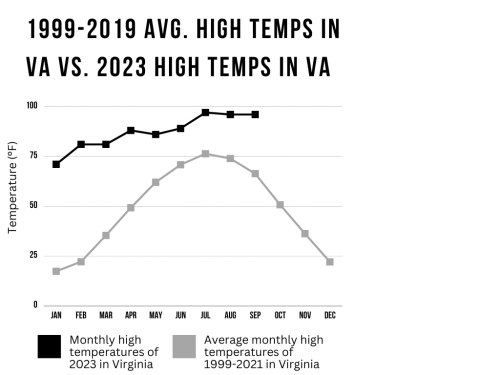Featured Image: Data from climate-data.org and extremeweatherwatch.com. Lily Reslink | Marlin Chronicle
Temperatures in 2023 have hit some of the highest levels recorded in the world’s history.
According to the Washington Post, June 2023 was the hottest June ever recorded. Additionally, July has been the hottest month of 2023 so far, and possibly the hottest month recorded in 174 years. It reached over 1.7 degrees Fahrenheit higher than the average, according to the National Oceanic and Atmospheric Association (NOAA) and while 1.7 degrees does not seem like much, many places really took the heat.
Arizona, a state that normally experiences hot weather, was 110 degrees for 31 consecutive days, CBS News reported. This is the highest continuous hot episode the state had reached since 1974. Additionally, according to the Washington Post; Texas, and many other Gulf-adjacent states have seen 5 to 8 degrees warmer days during July.
In Virginia, the hottest day this year reached 112 degrees in some parts of the Commonwealth, according to The Virginian-Pilot. This is roughly 22-26 degrees higher than the July average using data from Weather U.S.
These increased atmospheric temperatures lead to sea surface temperature rise.
While hotter beaches could seem like pleasant news to some, hotter oceans can have serious repercussions. As an example, Professor of Oceanic and Atmospheric Sciences and Director of Sustainability Dr. Elizabeth Malcolm said that the heating of the oceans can lead to more intense hurricanes.
Malcolm said this new heat brings more water vapor into the atmosphere, which can cause more precipitation during these tropical storms and hurricanes. This can lead to flooding with no current infrastructure to address the problem.
VWU sophomore and environmental science minor Elizabeth Smeltzer said that marine life suffers when the ocean temperatures rise. Coral often can’t survive in the hotter temperature waters, as it makes it harder for them to perform functions they need in order to survive.
Our local Chesapeake Bay is home to many species that suffer from this temperature rise. This can lead to food limitations when species that humans consume can no longer survive in the hot ocean.
This year’s heat was an accumulation of several factors. “We’ve had high pressure this summer across the US, which makes it sunnier,” Malcolm said. These are frequently called “heat domes” and have been recorded in many places throughout the summer months of 2023.
Rising temperatures can also be linked to El Niño. These weather patterns happen every couple of years interchangeably with their opposite, La Niña, weather patterns. This natural occurrence determines whether the year will be warmer or cooler.
“The El Niño impacts the climate globally,” Malcolm said, but the direct effects of this pattern mostly target the western United States and the Pacific Ocean.
While these weather patterns happen regardless of climate change, there is a correlation between the two.
“We have evidence that the general warming we’ve seen over the last few decades has been exacerbated by greenhouse gas emissions,” Malcolm said.
This means that these natural weather patterns are becoming more extreme because of climate change. Humans are impacting the weather just as much as the weather is impacting us.
Although the steadily increasing temperature can be frightening and dispiriting, there are several ways that we can help, as both individuals and as a community at Virginia Wesleyan University. Junior Jessica Wilson, an environmental science and sustainability management major and the vice-president of campus sustainability group Marlins Go Green, speaks out. Wilson said she understands how this news can bring people down, but has a different view on it. “It should be a call to action,” Wilson said. “This is not hopeless.”
Wilson believes we can each play a part in taking measures to prevent further temperature rise. “As an individual, you can take steps yourself to reduce your carbon footprint, like reducing your meat consumption and using reusables,” Wilson said.
Smeltzer said we can help by taking accountability for harming our climate. “We should take responsibility for this. We have a role to fill,” Smeltzer said. She said that everyone should be working to reduce this temperature change, “It doesn’t matter what party you are, what opinions you have. These issues affect everyone, regardless of what you believe in,” Smeltzer said.
Malcolm said that not only do we need to pressure ourselves for change, but we also need to pressure wealthy people and industries. “Everyday people can make some change, but we really need policies to change to be able to make a difference,” Malcolm said. “This gets back to the idea of advocacy.”
By Kara Hopkins

